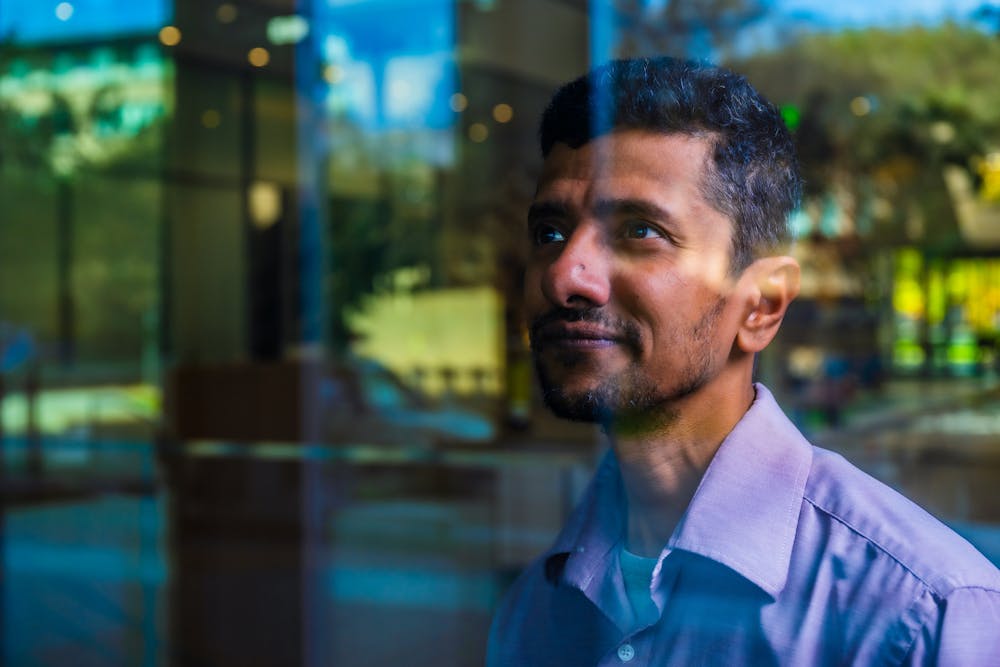Veeraraghavan receives O’Donnell Award for engineering research

Ashok Veeraraghavan, a professor of electrical and computer engineering, was awarded the 2024 Edith and Peter O’Donnell Award for “revolutionary imaging technology,” and will be recognized Feb. 6.
The Texas Academy of Medicine, Engineering, Science and Technology awards the Edith and Peter O’Donnell award to a Texas researcher “addressing the essential role that science and technology play in society” annually.
According to program director Stephanie Shaw, TAMEST award recipients present their research to conference attendees and receive a $25,000 honorarium and medal. Recipients are chosen from nominations and the finalist is selected with consideration from National Academy members and a committee of Texas Nobel and Breakthrough Prize Laureates.
“[The award is a] pathway to National Academy recognition, and I hope this assists [Veeraraghavan] in progressing his research and continuing his innovative and transformative work,” Shaw said.
Veeraraghavan credits the efforts of his entire lab for the award.
“It really is a recognition of the hard work, the creativity and the innovation done by an amazing group of graduate students and postdoctoral researchers at my lab in Rice,” Veeraraghavan said.
Vivek Boominathan, a postdoctoral research associate working on lensless imaging technology alongside Salman Khan, wrote in an email to the Thresher describing how the lab designed miniature cameras.
“Such cameras will have applications as wearables, can be implemented under the skull to study brain functions, and as eyes for micro-robots and endoscopes. We achieved this feat by completely redesigning the cameras by replacing traditional lenses with custom light-modulating flat masks placed on the imaging sensor. Instead of focusing light to create an image, we use computational techniques to re-focus the image from the camera measurements,” Boominathan said.
Mel White, a postdoctoral research fellow working on LiDAR, said that the collaborative environment in the lab helps them innovate to design complete imaging systems.
“We needed expertise across the full pipeline to make this work a reality — in optics, compressed sensing, integrated circuit design, CMOS fabrication and computational modeling,” White wrote in an email to the Thresher. “For me, this is why it’s so exciting to work with [Veeraraghavan]’s group: Our team is uniquely inter- and intra-disciplinary, and highly collaborative, which lets us design complete imaging systems from photon to transistor. We aren’t constrained to off-the-shelf parts or existing models; our imagination is the only limit.”
Haiyun Guo, a third-year Ph.D. student, and Boominathan worked on NeuWS technology to modify the original WS technology.
“Existing methods can image through scattering media and other obscurants by wavefront shaping methods using high-resolution spatial light modulators — but previous work generally requires guidestars, controlled illumination, point scanning and/or statics scenes and aberrations,” Guo wrote in an email to the Thresher.
Guo said that in collaboration with University of Maryland, they “introduce neural WS, a WS technique that can computationally correct for severe time-varying isoplanatic aberrations without a guidestar.”
Luay Nakleh, the William and Stephanie Sick Dean of Engineering and professor of computer science and biosciences, said 2024 is the second year in a row professors in the school of engineering have received the O’Donnell Award.
“Last year we had Professor Jaime Padgett, the Chair of Civil and Environmental Engineering recieve [the award],” Nakleh wrote in an email to the Thresher. “We do not work for recognition, but we value recognition and it is important that our faculty receives them. Great work does not happen over losing sleep over wondering whether you will get an award, [it] happens because you are passionate about it. [It] is important for the students to know that they shouldn’t chase recognition, chase quality and your passions.”
Ramamoorthy Ramesh, the vice president of research, stated that one of DesRoches’ goals is to expand research in the areas of energy, environment, climate change, urban dynamics, health sciences, AI technology and data sciences.
“[We are] investing more into research,” Ramesh wrote in an email to the Thresher. “[This recognition will] help grow our graduate and undergraduate programs.”
“Don’t work for the recognition,” Nakleh wrote. “Recognition comes when you do great work.”
More from The Rice Thresher

Rice welcomes 7.8% of applicants to class of 2029
Rice accepted 2,852 applicants to the class of 2029 March 26, said Yvonne Romero, vice president for enrollment. This represents 7.8% of 36,777, the highest acceptance rate since 2022.

Engineering school celebrates 50th anniversary, invites students, alumni and speakers
The George R. Brown School of Engineering invited engineering alumni, students and faculty to celebrate its 50th anniversary March 28-29. The event, which took place in the Engineering Quad, included speakers, a drone show, alumni gatherings and other social events like mixers.
Student store offers discounted merch to students
Select merchandise from the Campus Bookstore will now be available to students for a discounted price, according to an Instagram post by the Student Association in collaboration with the Campus Bookstore. Each month, designated “spirit items” will be offered at a 10% discount. For the month of March, the selected merchandise was two blue Rice T-shirts.


Please note All comments are eligible for publication by The Rice Thresher.